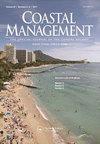Are Current UK Coastal Defences Good Enough for Tomorrow? An Assessment of Vulnerability to Coastal Erosion
IF 1.9
4区 环境科学与生态学
Q4 ENVIRONMENTAL SCIENCES
引用次数: 5
Abstract
Abstract Coastal vulnerability and its physical, economic and social consequences at national and international scales is of high scientific, political and policy interest. Anthropogenic climate change and coastal erosion threaten the very fabric of a society. Indications, that coastal hazards are impacting diverse coastal areas severely across the world, and it is no longer a vague future threat that can’t be ignored. Rising eustatic sea levels synthesized by the growing frequency and scale of coastal hazards like storm surges, coastal erosion and coastal landslides threaten low-lying and unprotected coastal areas in the United Kingdom even if they have coastal defenses. However, there is still significant uncertainty about the degree of vulnerability along different coastal stretches, particularly in England. To fill this uncertainty, the current study estimated the coastal vulnerability of the coastal erosion hotspot Camber, England, by establishing a coastal vulnerability index. This index was developed by compounding various existing parameters and termed as Erosion Coastal Vulnerability Index (ECVI). Results illustrate that 67% of coastal area fall between high and very high vulnerability categories, and current coastal defenses are not strong enough to tackle the severe coastal erosion in Camber. Within the evaluation, thematic maps were generated to enable the intensity of the vulnerability for different coastal stretches to be identified. The evaluated vulnerable hotspot should be treated urgently by regional and national policy organizations to ameliorate the impacts of coastal erosion and other associated risks. Without action, the hotspot is likely to encounter unprecedented new vulnerabilities, disasters and humanitarian catastrophes. The current study results allow for a local, regional and national comparison that may help to evaluate changes in coastal erosion vulnerability.英国目前的海岸防御能力是否足以应对未来?海岸侵蚀脆弱性评估
沿海脆弱性及其在国家和国际范围内的自然、经济和社会后果具有高度的科学、政治和政策意义。人为的气候变化和海岸侵蚀威胁着社会的根本结构。种种迹象表明,沿海灾害正在严重影响世界各地不同的沿海地区,它不再是一个不可忽视的模糊的未来威胁。由于风暴潮、海岸侵蚀和海岸滑坡等海岸灾害的频率和规模不断增加,海平面上升威胁着英国低洼和未受保护的沿海地区,即使这些地区有海岸防御设施。然而,在不同的沿海地带,特别是在英格兰,脆弱性的程度仍然存在很大的不确定性。为了填补这一不确定性,本研究通过建立海岸脆弱性指数来估计英国海岸侵蚀热点Camber的海岸脆弱性。该指数综合了各种现有参数,被称为海岸侵蚀脆弱性指数(ECVI)。结果表明,67%的沿海地区处于高脆弱性和极高脆弱性之间,目前的海岸防御不足以应对坎伯严重的海岸侵蚀。在评估过程中,绘制了专题地图,以便确定不同沿海地区的脆弱性强度。区域和国家政策组织应紧急处理评估的脆弱热点,以减轻海岸侵蚀和其他相关风险的影响。如果不采取行动,这一热点地区很可能遭遇前所未有的新脆弱性、新灾害和人道主义灾难。目前的研究结果允许对地方、区域和国家进行比较,这可能有助于评估海岸侵蚀脆弱性的变化。
本文章由计算机程序翻译,如有差异,请以英文原文为准。
求助全文
约1分钟内获得全文
求助全文
来源期刊

Coastal Management
环境科学-环境科学
CiteScore
6.00
自引率
0.00%
发文量
24
审稿时长
>36 weeks
期刊介绍:
Coastal Management is an international peer-reviewed, applied research journal dedicated to exploring the technical, applied ecological, legal, political, social, and policy issues relating to the use of coastal and ocean resources and environments on a global scale. The journal presents timely information on management tools and techniques as well as recent findings from research and analysis that bear directly on management and policy. Findings must be grounded in the current peer reviewed literature and relevant studies. Articles must contain a clear and relevant management component. Preference is given to studies of interest to an international readership, but case studies are accepted if conclusions are derived from acceptable evaluative methods, reference to comparable cases, and related to peer reviewed studies.
 求助内容:
求助内容: 应助结果提醒方式:
应助结果提醒方式:


